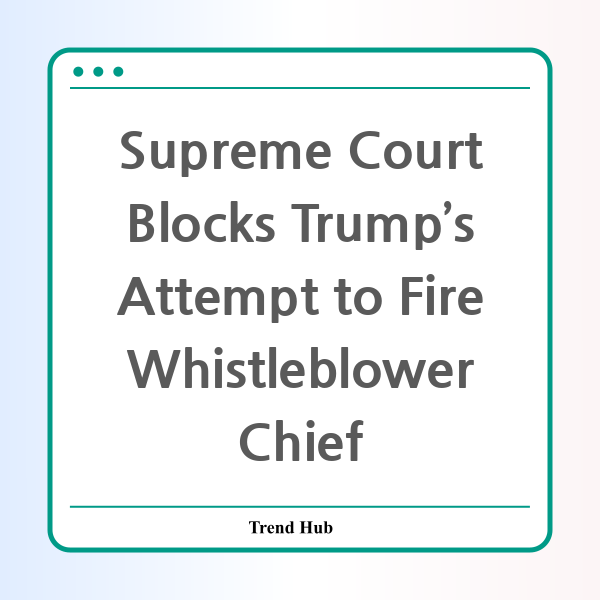* This website participates in the Amazon Affiliate Program and earns from qualifying purchases.

In a significant ruling that underscores the ongoing tension between the executive branch and independent oversight agencies, the U.S. Supreme Court has temporarily halted former President Donald Trump’s efforts to dismiss the head of the Office of Special Counsel, Hampton Dellinger. This case represents not only a pivotal moment for government accountability but also sheds light on the broader implications of Trump's administration's attempts to reshape federal entities.
The Supreme Court's decision to intervene comes amidst a backdrop of numerous legal challenges faced by Trump following his second inauguration. In a landscape characterized by a flurry of executive orders and directives, legal scrutiny has become an unavoidable aspect of Trump's presidency. The ruling allows Dellinger, a Biden appointee, to remain in his position at least until February 26, signaling a check on presidential power.
Hampton Dellinger’s appointment as the head of the Office of Special Counsel was designed to protect whistleblowers—the individuals who play a crucial role in uncovering government misconduct. By attempting to dismiss Dellinger without citing legitimate job performance issues, Trump’s actions raise serious questions about accountability and oversight in government operations.
Legal experts highlight the potential ramifications of this case. The Supreme Court’s ruling not only ensures Dellinger’s continued presence in the Office of Special Counsel but also sets a precedent regarding the limits of presidential authority in firing independent agency heads. With dissent from conservative justices, including Neil Gorsuch and Samuel Alito, the case has illustrated the complex dynamics within the Supreme Court regarding executive power. Their dissent emphasized concerns that lower courts may have overstepped their authority in reinstating Dellinger.
In addition to the immediate implications for Dellinger, the broader context of this case cannot be overlooked. It reflects the ongoing struggle for oversight and accountability in the federal government, particularly as Trump’s administration has faced numerous lawsuits regarding its actions. From immigration policies to federal employee buyouts, these legal challenges underscore the precarious balance between executive authority and the rule of law.
With dozens of lawsuits flying in the wake of Trump’s directives, the Supreme Court's ruling serves as a reminder that the judicial system acts as a crucial check on executive power. It reminds us that independent oversight agencies are essential in ensuring that government operations are conducted transparently and ethically.
As this legal battle unfolds, the implications for government accountability, whistleblower protection, and the power dynamics between branches of government will likely reverberate well beyond February 26. The Supreme Court's stance on this issue may very well shape the landscape of governmental oversight for years to come.
In conclusion, the Supreme Court's decision to pause Trump's dismissal of Dellinger is a pivotal moment in the ongoing question of executive authority versus independent oversight. This case will not only affect the functioning of the Office of Special Counsel but also has the potential to redefine the principles of accountability within our government.
* This website participates in the Amazon Affiliate Program and earns from qualifying purchases.